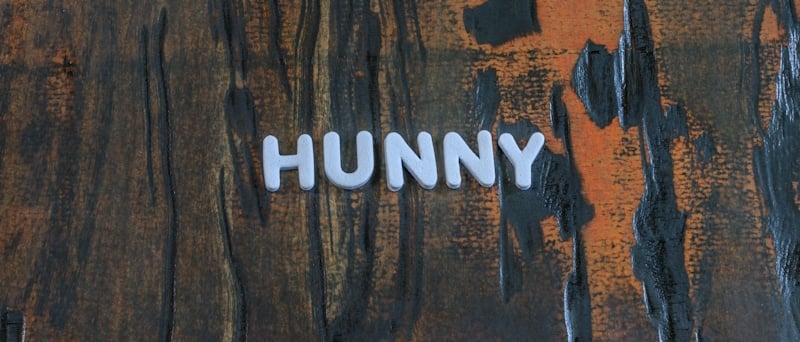Sometimes it is necessary to take the time to review our spelling. This time we invest will help us to improve it. Good spelling is a way of showing others that we respect the rules. It is a way to cultivate the correct use of language to benefit from more fruitful and effective communications. Today, within the infinite world of words, we will dedicate our article to understanding the differences between the words “honey” and “hunny.”
The word “honey” is a fluid of viscous texture that bees produce thanks to the nectar of plants. On the other hand, the word “hunny” is a term of endearment that people use to refer to someone they love. It is an alternative and incorrect spelling of the word “honey.”
When we improve spelling, we convey ideas that are easier for our recipients to understand. Improving spelling is an ascending ladder that will lead us to communicate much better. Therefore, today we will take the opportunity to study all the essential elements of the words “honey” and “hunny”: their definitions, origins, uses, examples, and much more.

What Is The Definition Of The Word “Honey”?
The word “honey” is a term that is familiar to everyone. Many people might think they know its meaning perfectly well. But sometimes we can be surprised by some words. There are times when the definition of a word is so ingrained in popular culture that we forget about other meanings that also correspond to the same term. Below we will study the main definitions of “honey.”
Honey As A Noun
- It is a sweet fluid with a dense texture that bees produce from the nectar of flowers and store in their hives as food.
- A substance that people use in cooking as an ointment or sweetener.
- Flower nectar
- Any kind of viscous, sweet-tasting substance that insects produce.
- Something sweet, delicious, or pleasant.
- A person for whom someone feels deep love, affection, or fondness.
- A term of endearment or familiarity that people use to address a child, romantic partner, or pet.
- Offensive term when people use it with strangers, casual acquaintances, or subordinates.
- Something of exceptional quality, having a degree of excellence.
Honey As An Adjective
- About honey, sweet.
- Containing honey or something having the aroma or taste of honey.
Honey As A Verb
- To speak in a flattering or affectionate way.
- To sweeten or flavor something with honey.
The Origin Of The Word “Honey”
From the earliest times when man experienced the beginning of civilization, “honey” has been synonymous with sweetness, joy, and the generosity that nature provides. More than 8000 years ago, researchers found a cave painting in Valencia, Spain. This painting shows a human figure collecting honey from a beehive while bees are flying around him.
There is also evidence of explorers finding traces of honey inside clay pots in a Georgian tomb more than 2700 BC. Ancient Egyptian cultures used honey for embalming the dead. According to them, only honey could magically preserve bodies forever.
According to some linguists, the history of the word “honey” comes from Proto-Indo-European. According to this theory, almost all European languages spoken from Iran to India come from the same source. This source was a group of people who lived somewhere between the Black Sea and the Caspian Sea. This group of people successfully populated Eurasia, and languages as different as Greek, German, Latin, and Hindi grew from the same root.
There is still no evidence of what the Proto-Indo-European language sounded like. That is why linguists has tried to find out what kind of language would result from such a diverse mixture. These investigations resulted in “honey” coming from “melit,” which in Greek gave rise to “melis,” in Latin “mel,” in Sanskrit, “madhu,” and in French, “miel.”
But in English, it did not happen in the same way. It turns out that the Germanic branch of the Indo-European family got a bit out of the course of the other groups. These inhabitants of the North Sea began to describe honey by its color. They used k(e)neko to refer to it being “golden yellow.” This interpretation evolved into:
- Old Germanic: huna(n)go.
- Old Norse: honung.
- Old English: hunig.
Over time, this word evolved, and the medieval “hunig” changed to the current “honey.”
What Is The Definition Of The Word “Hunny”?
The definition of “hunny” is less extensive. It is slang that became an alternative spelling of the word “honey.” Here is what it means.
Hunny As A Noun
“Honey” is a way of addressing someone you like, appreciate or love.
It is an affectionate expression that people use with someone they want to be nice to.
What Is The Origin Of The Word “Hunny”?
There is no tangible evidence as to exactly when the transformation of “honey” into “hunny” occurred. However, we are going to narrate the most popular version that we find today.
As we already know, the word “honey” is one of the oldest terms in civilization. The term changed to what we know today when people described it by its “golden yellow” color.
Older people say that honey can do almost anything, heal wounds, soothe sore throats, and improve the outcome of our favorite foods.
Some linguists explain that the term “hunny” appeared in the first Winnie the Pooh movie, which paradoxically had the title “Winnie the Pooh and the Honey Tree.” The word “hunny” seems to be spelled that way on the labels of many empty Winnie the Pooh pots.
This intentional misspelling had the intention to convey a feeling of tenderness towards the language used by the characters living in the forest. This form of spelling has deeply permeated society. So much so that today people use the word “hunny” as a matter of course, and contemporary society has already adopted it as part of popular culture.

How Do I Know When I Can Use “Honey” Or “Hunny”?
To differentiate when we can use one word instead of the other, we only have to refer to the definitions of each one. We usually use “honey” to refer to food. Sometimes, some people use “honey” instead of “hunny” to express affection for their loved ones. This use happens because it is a kind of misspelling of love.
The exciting thing is that we can substitute the word “hunny” for “honey” to express affection. Still, we cannot substitute “honey” for “hunny” to talk about food. When we use “honey” as an expression of affection between two people, love is associated with something sweet. But using “hunny” with the same intention is much more tender.
The key is to understand the meanings of each word; if this is so, we will not have any problem when using them.
How Do People Use The Word “Honey”?
The word “honey” has a lot of action in people’s modern lives. Some of the most common uses are in a few areas that we will see below.
- People use the word “honey” to express love, affection, or appreciation between people.
- In the food sector, “honey” is a word widely used in cooking, baking, desserts, as a spreadable product, as an ingredient in beverages, as a sweetener.
- In the world of beverages, the word honey is also widely used. People use honey as an additive in the preparation of certain fermented drinks.
- In the field of medicine, “honey” is a trendy word for everything related to wounds and burns. According to scientists, honey has healing properties for all kinds of injuries.
- Also, in the medical field, we find that the word “honey” is used every day because it acts as a natural topical antibiotic.
- Another everyday health-related use of the word “honey” is its ability to help combat chronic and acute coughs.
Example Of The Use Of The Words “Honey” And “Hunny”
To culminate this fabulous learning experience, we would like to show you some practical examples of the use of “honey” and “hunny” in simple standard sentences.
Examples With The Word “Honey”
- The taste of this meat is the same as honey.
- Why don’t you come with me to the party, honey? If you don’t go, it’s not worth going alone.
- Grandma left the jar of honey outside the fridge.
- If you’ll take my advice, add a spoonful of honey to your tea.
Examples With The Word “Hunny”
- Come on, hunny, give me another chance.
- Hunny, I could only trust you in this place.
- Oh, hunny, did you really think you were going to get away with it?
- Hunny, let’s not forget I live in Flushing, Queens.
A Final Thought On The Words “Honey” And “Hunny”
This trip into the world of the words “honey” and “hunny” was very productive. We already know the “sweet” relationship that exists between these words. It is this same close relationship that can cause some confusion when using them.
Fortunately, we have been able to clarify some relevant aspects throughout this article. The correct use of language is a muscle that we must exercise every day. If we are demanding in this training, we will have fantastic results that we will see reflected in our communication process.
Shawn Manaher is the founder and CEO of The Content Authority. He’s one part content manager, one part writing ninja organizer, and two parts leader of top content creators. You don’t even want to know what he calls pancakes.

